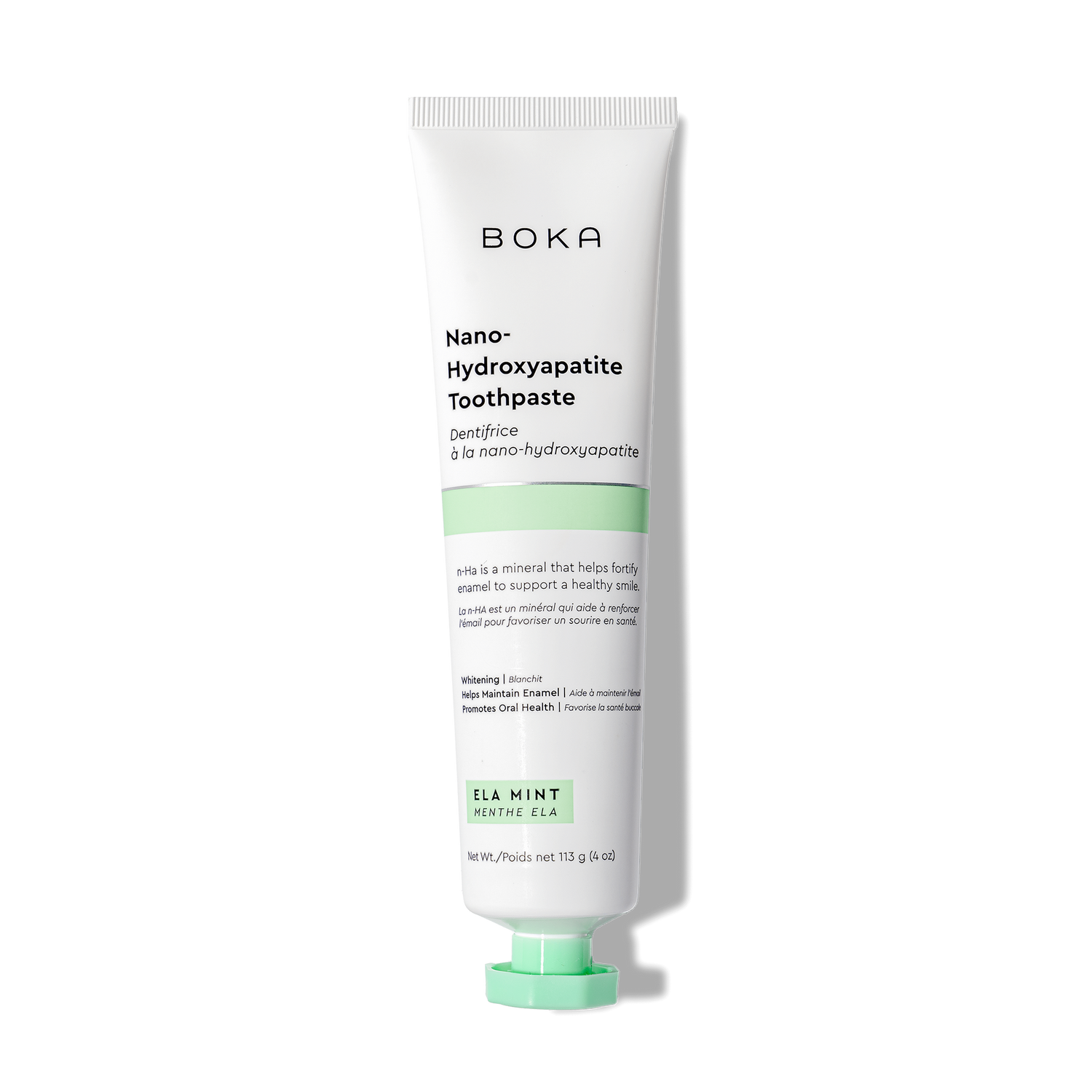Want to have movie-star quality teeth? Well, you’re in luck! This helpful guide has everything you need to know about fluoride and teeth whitening.
When it comes to the question of whether fluoride whitens teeth, the short answer is no. In fact, excessive fluoride use could instead cause tooth discoloration! But don’t worry – there are multiple fluoride-free alternatives that can do an even better job.
Take Boka’s non-toxic and dentist-approved toothpaste, for example. It has been proven by researchers to reduce sensitivity and remineralize teeth, all while whitening your precious chompers.
So, if you want to maintain a white smile but are simply sick of what fluoride toothpaste could be doing to your body – read on! This helpful article will provide effective ways to whiten your teeth without the use of harsh chemicals or bleach.
Specifically, we will cover:
- Causes of tooth discoloration
- How to whiten teeth
- Tips for preventing teeth from becoming stained or discolored
- Boka’s non-toxic and dentist-approved toothpaste, and how it can help.
Let’s jump right in!
Causes Of Tooth Discoloration
Tooth discoloration has a variety of causes that should be nailed down before seeking treatment.
Common causes involve drinks such as coffee, tea, and red wine – not to mention nicotine products like cigarettes or chewing tobacco.
Even age is a factor. With time, the yellowish bony tissue (dentin) is revealed as your enamel starts to thin. Make sure that you’re brushing and flossing daily to prevent plaque and tartar!
Some medications such as tetracycline antibiotics have also been linked to tooth discoloration.
Excessive exposure to fluoride is a common cause too, with fluorosis staining your teeth off-white or brown.
How To Whiten Teeth?
Thankfully, there are many teeth whitening products, home remedies, and professional whitening treatments to help:
Using Teeth Whitening Products
Whitening toothpaste
Brushing your teeth with a specialty toothpaste is the simplest method. However, the results can vary depending on the brand.
Boka’s teeth whitening toothpaste, for example, ditches your typical peroxide-based whitening toothpaste in favor of gentle ingredients that brighten and whiten.
|
PROS |
CONS |
|
Easy to incorporate into daily routine |
May take a while to see results |
|
Often contain fluoride for added benefits |
Effectiveness can vary from brand to brand. Use Boka for great results |
|
Affordable brands such as Boka |
Can contain peroxide (unless it’s Boka) |
Whitening strips
PAP and nano-hydroxyapatite are used to create these thin plastic strips, designed to remove stains while being gentle on tooth sensitivity. Check out Boka Whitening strips here.
|
PROS |
CONS |
|
Easy to use |
Potential to cause tooth sensitivity |
|
Visible results in a couple of weeks |
May struggle to whiten teeth evenly |
|
Available in most stores |
Whitening gels
Containing hydrogen peroxide or carbamide peroxide, whitening gels are applied directly to your teeth. This is done using a store-bought kit with multiple syringes and trays.
|
PROS |
CONS |
|
Done at home with professional quality |
Potential to cause tooth sensitivity |
|
Perfect for mild stains |
Requires frequent use |
Whitening mouthwashes
Just like regular mouthwash, whitening mouthwash is designed to be swished around for 30 seconds to a minute. It is best to do this after you brush and floss your teeth.
|
PROS |
CONS |
|
Easy to incorporate into daily routine |
Not as strong so results can be varied |
|
Maintains whiteness after first use |
Potential to cause tooth sensitivity with frequent use |
Home Remedies
Baking soda and water paste
When mixed with water to form a paste, baking soda will do all the basics of a stock standard toothpaste from whitening teeth to neutralizing acids.
Boka’s teeth-whitening toothpaste contains baking soda, so you get all the benefits along with many other fantastic teeth-whitening ingredients.
|
PROS |
CONS |
|
Available in most households |
Results could be varied |
|
Mild abrasive |
Tooth enamel could be damaged with overuse |
|
Extremely effective when used with other teeth-whitening ingredients |
Hydrogen peroxide rinse
If you dilute store-bought hydrogen peroxide with water and then gargle the result for 30 seconds to a minute, this will help remove teeth stains.
|
PROS |
CONS |
|
Easy to make at home |
Misuse could cause irritation |
|
Potential to cause tooth sensitivity with frequent use |
Activated charcoal
Used in a variety of healthcare products, charcoal can purportedly absorb a variety of toxins or stains. However, there is little to no evidence to back up these claims.
|
PROS |
CONS |
|
Absorption properties |
Limited evidence to its effectiveness |
|
Very popular and readily available |
Could cause enamel abrasion |
Coconut oil pulling
Coconut oil will fight bad breath and improve overall oral health by removing toxins and bacteria staining your teeth.
Coconut oil is also an ingredient in Boka’s whitening toothpaste! Combined with nano-hydroxyapatite, these ingredients help to restore teeth to their natural whiteness.
|
PROS |
CONS |
|
Natural and holistic |
Limited evidence to its effectiveness |
|
Great for overall oral hygiene |
Requires frequent use |
|
Fantastic when used in conjunction with other teeth-whitening ingredients found in Boka products |
Professional Whitening Treatments
In-office laser whitening
This method involves a specialized laser activating a high-concentration of peroxide gel that has been gently applied to your teeth.
|
PROS |
CONS |
|
Instant and noticeable results |
Expensive |
|
Overseen by professional |
Potential to result in temporary tooth sensitivity |
Custom-made trays with bleaching gel
Similar to the aforementioned whitening gels, these are custom-made by your dentist to fit your specific needs and tooth shape.
|
PROS |
CONS |
|
Done at home with professional quality |
Multiple visits to the dentist |
|
Customizable kit |
Potential to cause tooth sensitivity |
Prescription-strength whitening products
Only available through your dentist, these products will often use high-concentration peroxide gels or top-of-the-line whitening agents.
|
PROS |
CONS |
|
Great for severe stains |
Expensive |
|
Overseen by professional |
Potential to result in temporary tooth sensitivity |
Tips for preventing teeth from becoming stained or discolored
Feeling overwhelmed? Not to worry! Below are some tips to prevent tooth discoloration:
- Limit dark-colored beverages (coffee, tea, red wine). These beverages have all been linked to tooth discoloration due to their high levels of chromogens (colored dye compounds).
- Quit smoking or using tobacco products. Smoking or chewing tobacco is known to cause tooth discoloration due to tar and nicotine coating your enamel with a yellowish stain.
- Rinse mouth after consuming staining foods/drinks. You don’t have to use anything fancy, just a bit of water will do the trick.
- Use a straw for beverages that can stain teeth. Minimizing contact between the beverage and your teeth can be easily achieved with a straw.
- Brush teeth after eating or drinking staining substances. Get rid of harmful bacteria by brushing your teeth right after food and drink consumption!
- Consume dairy products and foods high in fiber. Dairy products have been proven to maintain and strengthen tooth enamel.
- Visit the dentist regularly for cleanings. Even just one professional cleaning a year is a fantastic way to prevent stains.
- Consider dental sealants for added protection. If applied to the chewing surfaces of molars, dental sealants can do wonders to prevent stains.
- Use a fluoride toothpaste. Although not as capable as other dentist-approved methods, fluoride is great for tackling basic stains if used in moderation.
- Be cautious with acidic foods and drinks. To avoid enamel erosion, stick with healthy, non-acidic food items.
Try Boka's Non-Toxic Whitening Toothpaste
It's clear that there are many fantastic fluoride-free alternatives to whiten your teeth! In fact, Boka’s own whitening toothpaste is a fantastic option.
It has all the amazing benefits of your typical hydroxyapatite toothpaste with some added advantages from its non-toxic ingredients to its dentist-approved formula.
Hydroxyapatite contains a calcium-phosphorus compound that comprises 97% of your tooth enamel and 70% of your dentin, meaning that it can biomimic your natural tooth composition unlike any other toothpaste on the market!
It even does all this while being vegan, sulfate-free, paraben-free, cruelty-free, and free from artificial flavors. Honestly, the list of benefits is endless!
So, what are you waiting for? n-Ha toothpaste is the obvious choice for whitening your teeth, so why not start with Boka?
We’re passionate about oral hygiene and have a variety of proven ingredients and feel-good formulas that beat any found in your typical fluoride-based product.
You can easily pick up the next step to a healthy smile right HERE.
FAQs
Which toothpaste is best for whitening?
This depends on your specific needs, but Boka’s whitening toothpaste is a fantastic all-round solution (if we may say so ourselves).
Can yellow teeth become white again?
Yes! There are plenty of teeth whitening methods available (such as those listed above) to help yellow teeth become white again.
What are the disadvantages of fluoride for teeth?
The biggest disadvantage of fluoride is that it can cause fluorosis or tooth discoloration.
Should we avoid fluoride?
Not necessarily. However, if your goal is to whiten your teeth, you should definitely use alternate products.
Can salt whiten teeth?
Salt can temporarily whiten teeth, but for the sake of your overall oral health, use a dentist-approved method.
What do dentists use to whiten teeth?
Dentists use a multitude of teeth whitening methods such as high-concentration peroxide or bleaching gels.


